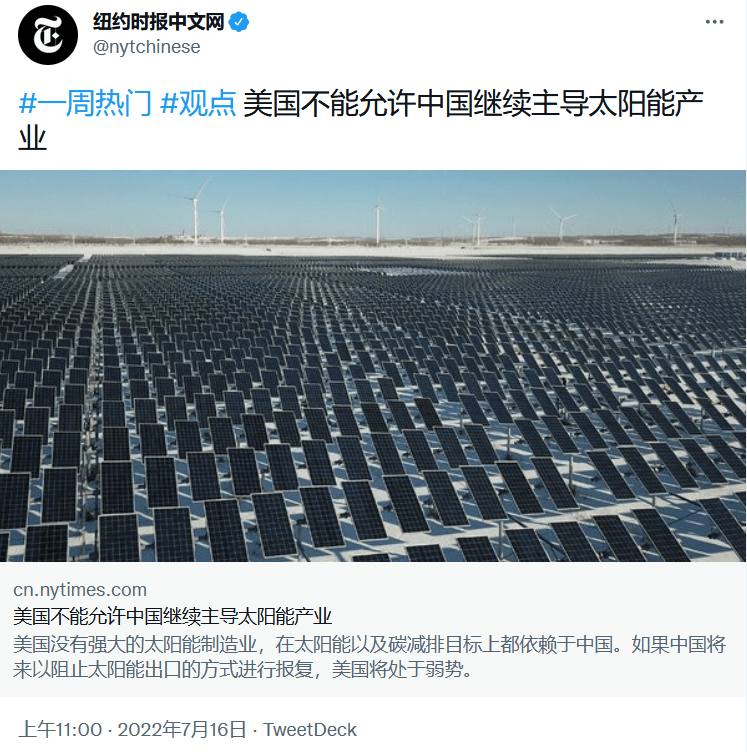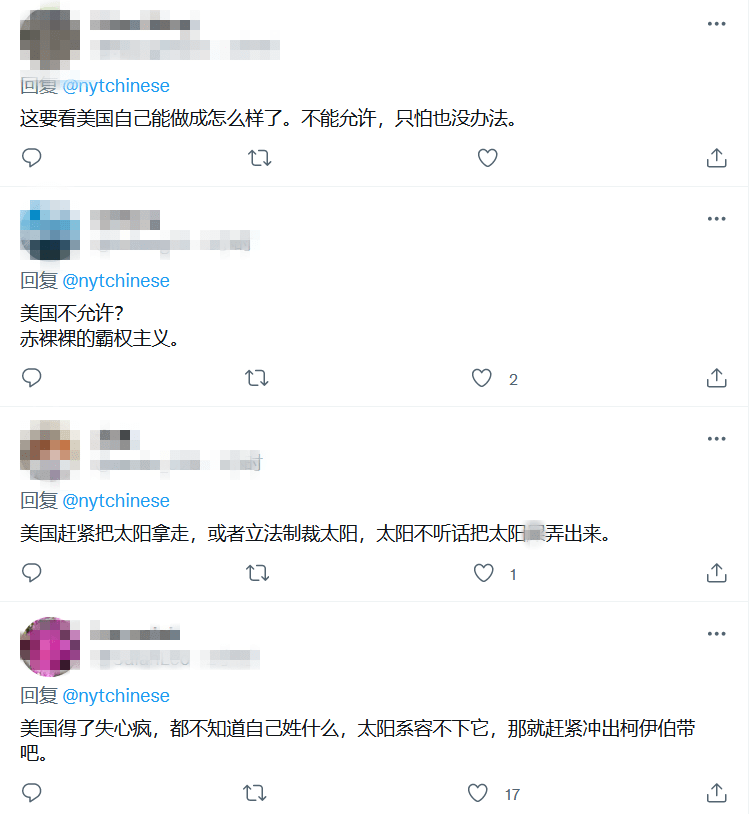風蕭蕭_Frank
以文會友美媒揚言“不許中國繼續主導美國太陽能產業”,評論區太喜感了
2022-07-16 20:51
(觀察者網訊)16日,美媒“紐約時報中文網”在推特上發布了,美國前副貿易代表羅伯特·霍利曼(Robert Holleyman)有關中美太陽能產業的文章,氣急敗壞嚷嚷著“美國不能允許中國繼續主導太陽能產業”。
文章一如既往“潑髒水”的慣常操作,將美國太陽能市場的慘敗怪罪於中國,煞有其事稱是因為中國政府20多年來向其國內太陽能企業提供了“巨額補貼”,這才“直接”導致沒有獲得國家支持的美國太陽能產業被“壓垮”了。
美國對中國太陽能產業的打壓迄今已有十餘年,主導的“雙反”調查等一度令其受到致命性打擊,但中國最終憑借自身努力逆風翻盤,如今成為太陽能產業的全球領導者。
這也讓本文的評論區顯得尤為喜感,不少人抱著“就喜歡你看不慣我又幹不掉我”的心態來奇文共賞,嘲諷美國有些人是妥妥的霸權主義思想,諸如“美國幹脆去製裁太陽吧”、“美國臉大到能把太陽包起來”、“太陽係容不下美國了”等逗趣吐槽層出不窮。

“紐約時報中文網”翻譯的這篇評論文,英文原文發表於7月9日,標題為“美國不能允許中國繼續擠壓我們的太陽能產業”,作者是羅伯特·霍利曼(Robert Holleyman)。2014年至2017年,他在奧巴馬政府中擔任美國副貿易代表。
文章開篇就營造恐慌,霍利曼狂敲警鍾稱美國現在若還不在太陽能產業上下功夫,那麽未來除了在減排方麵要依賴中國以外,還有可能被中國在太陽能技術和產品方麵上“卡脖子”。他還以小人之心度君子之腹,警告道若未來中國以阻止太陽能出口的方式進行報複,對中國太陽能產業深度依賴的美國將不堪一擊,處於劣勢。
緊接著霍利曼才慢條斯理開始“憶當年”,稱美國自1950年代發明光伏技術後的幾十年裏在太陽能領域保持了毋庸置疑的領導地位。
隨後話鋒一轉,他反手就把導致“美國太陽能產業巔峰不再”的這口鍋扣在了中國頭上——“如今我們的太陽能產業被壓垮了,這是中國從2000年開始向其製造商提供巨額補貼的直接後果。”霍利曼認為,美國政府沒有對其太陽能企業提供足夠的支持,所以他們在中國麵前沒有競爭力。
同時他表示,美國商務部當下雖然正在調查中國太陽能企業是否通過第三方國家規避美國貿易法,但拜登政府6月宣布對來自東南亞四國的太陽能電池板免征兩年關稅,而這裏正是許多中國太陽能廠商布局海外產能的地方。
霍利曼不滿道,如果商務部發現中國確實在通過東南亞出口太陽能組件,拜登實際是在“接受潛在的貿易違規行為並放棄實施處罰”。他認為,拜登是在進行一場“賭博”,稱從短期來看這項舉措對美國太陽能製造商來說是一個權宜之計,但從長期來看會進一步加深美國對中國太陽能市場的依賴。
絮絮叨叨了一大堆“依賴中國的後果”,霍利曼才終於說出自己的目的:他是想在9月30日之前呼籲各界讓參議院通過一項關於5500億美元的清潔能源投資和稅收抵免的法案,其中就包括對美國光伏電站投資的稅收抵免和對重建美國光伏供應鏈的資金支持。法案目前已在眾議院通過,但在參議院受阻。
霍利曼對這一法案將產生的影響非常樂觀,他在文章中援引美國太陽能製造商的觀點稱,法案通過後他們可以在2030年之前將計劃的太陽能部署全部完成。這些投資還將創建一個完整的國內太陽能供應鏈,生產100%的美國製造太陽能板。
臨了,他還要再威脅一句:要是再讓美國依賴中國的進口產品,代價就是犧牲美國的就業和可再生能源安全!

英文原文報道
一周過去了,霍利曼的原文報道沒獲得多大關注,直到“紐約時報中文版”16日發布了譯文,以一句“美國不能允許中國繼續主導太陽能產業”的無能狂怒,“喜提”網友花式神吐槽。
與作者的氣急敗壞形成鮮明對比的是,評論區裏洋溢著歡樂的氣氛。諸如“美國幹脆去製裁太陽吧”、“美國臉大到能把太陽包起來”、“太陽係容不下美國了”、“美國不允許中國做的事多了去了,你不如趕緊許願吧”……喜感評論層出不窮。


“就喜歡看你看不慣我又幹不掉我的樣子……”

美國不能允許中國繼續主導太陽能產業
GUEST ESSAY
America Can't Allow China to Keep Crushing Our Solar Energy Industry
https://gaatimes.com/opinion-america-cant-allow-china-to-keep-crushing-our-solar-energy-industry/

Solar panels and wind turbines in Zhangjiakou, China. Credit...Greg Baker/Agence France-Presse, via Getty Images
By Robert Holleyman
Mr. Holleyman was the deputy U.S. trade representative in the Obama administration from 2014 to 2017.
A robust solar energy industry in the United States is crucial to the nation’s goal of a low-carbon future. But the prospects for solar energy are not looking bright these days, because the United States has allowed China to dominate the industry. Failure to create a strong domestic solar manufacturing industry leaves the United States and our carbon-reduction goals not just dependent on China, but also vulnerable should China block or threaten to block its solar exports as a form of retaliation in the future.
The United States was once a global leader in both solar innovation and manufacturing — we inventedphotovoltaic technology in the 1950s to power satellites and spacecraft. And we retained our undisputed leadership in solar for decades. But lately we have seen our solar industry get crushed as a direct consequence of China’s huge state subsidies to its manufacturers beginning in the 2000s.
Since then the U.S. share of solar component shipments worldwide fell to less than 1 percent in 2021 from 13 percent in 2004. China’s share of the production of solar components has increased over the past two decades from virtually nothing to nearly 85 percent today. For some solar components, that could rise to 95 percent in the coming years, according to a report this week from the International Energy Agency. Simply put, the United States did not provide enough support to its solar companies, which could not compete in the face of China’s state-directed strategy to control the market.
President Biden has called for measures aimed at increasing U.S. manufacturing of solar photovoltaic modules and components. Although the declarationfrom the White House never mentioned China by name, China and its market-distorting subsidies were at the heart of the orders. Mr. Biden certainly knows that the United States must not remain dependent on an unreliable third party and economic adversary for our national energy security.
Even as Mr. Biden called for investing in solar production, he took steps that furthered American reliance on China, at least in the short term. The Commerce Department has been investigating whether Chinese solar manufacturers are circumventing U.S. trade laws through third-party countries; even so, this administration declined to use trade enforcement by placing a moratorium on new duties for up to two years. As a result, the United States will effectively look the other way even if it is determined that imports from Southeast Asia are a result of Chinese tariff evasions. This decision to forgo enforcement might help solar installers in the short term, but it is a significant gamble since it is not accompanied by the essential elements needed to build our domestic solar industry.
To end our dependence on China, we must grow American solar production, and so Congress must reach a deal on a spending agreement that provides resources for large-scale clean energy development as well as solar manufacturing tax credits.
U.S. solar manufacturers claim that they could meet the entire projected solar deployment by 2030 if Congress passes clean energy funding and solar manufacturing tax credits. These investments would create an entirely domestic solar supply chain producing 100 percent American-made panels. Otherwise, we will perpetuate our dependence on Chinese solar imports and forever handicap American solar production.
Unfortunately, for the moment, the administration is giving up on enforcement and continuing our reliance on foreign solar while waiting for Congress to approve legislation to promote domestic manufacturing. If the Commerce Department finds that China is indeed illegally rerouting photovoltaic modules through Southeast Asia, President Biden will effectively be accepting potential trade violations and forgoing the imposition of penalties. This would give China a pass at the very moment when efforts to hold China accountable on trade, forced labor in the supply chain and national security are ramping up. And should Congress fail to act to spur the development of American solar manufacturing, our dependency on artificially cheap Chinese imports will grow.?
Failure to establish our own supply chains would be akin to the United States switching from relying on OPEC and Russia for energy to relying on China. Aside from the consequences of the leading solution to unabated climate change being subject to the whims of a foreign power that doesn’t play by the rules, Americans will be shut out of the high-quality manufacturing solar jobs that will come about from this transition.
In a matter of months, we will know whether the Biden administration’s gamble pays off. Sept. 30 is the deadline for the Senate to pass a reconciliation bill that includes clean energy funding and solar manufacturing tax incentives. But whatever happens, one thing is clear: The White House and Congress cannot perpetuate America’s dependency on Chinese imports at the cost of American jobs and renewable-energy security.??
Robert Holleyman was the deputy U.S. trade representative in the Obama administration from 2014 to 2017.




